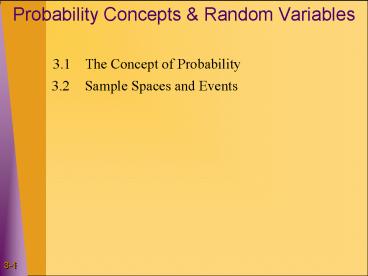Probability Concepts - PowerPoint PPT Presentation
1 / 9
Title:
Probability Concepts
Description:
An experiment is any process of observation with an uncertain outcome. ... Listeners = Population x Share = 8,300,000 x 0.08 = 668,100 ... – PowerPoint PPT presentation
Number of Views:18
Avg rating:3.0/5.0
Title: Probability Concepts
1
Probability Concepts Random Variables
- 3.1 The Concept of Probability
- 3.2 Sample Spaces and Events
2
3.1 Probability Concepts
An experiment is any process of observation with
an uncertain outcome. The possible outcomes for
an experiment are called the experimental
outcomes. Probability is a measure of the chance
that an experimental outcome will occur when an
experiment is carried out
3
Probability
If E is an experimental outcome, then P(E)
denotes the probability that E will occur
and Conditions If E can never occur, then P(E)
0 If E is certain to occur, then P(E) 1 The
probabilities of all the experimental outcomes
must sum to 1. Interpretation long-run relative
frequency or subjective
4
Assigning Probabilities toExperimental Outcomes
- Classical Method
- For equally likely outcomes
- Relative frequency
- In the long run
- Subjective
- Assessment based on experience, expertise, or
intuition
5
3.2 The Sample Space
The sample space of an experiment is the set of
all experimental outcomes. Example 3.2 Genders
of Two Children
6
Computing Probabilities of Events
An event is a set (or collection) of experimental
outcomes. The probability of an event is the sum
of the probabilities of the experimental outcomes
that belong to the event.
7
Example Computing Probabilities
Example 3.2 Genders of Two Children
Events P(one boy and one girl) P(BG) P(GB)
¼ ¼ ½ P(at least one girl) P(BG)
P(GB) P(GG) ¼ ¼ ¼ ¾
Note Experimental Outcomes BB, BG, GB, GG All
outcomes equally likely P(BB) P(GG) ¼
8
Probabilities Equally Likely Outcomes
If the sample space outcomes (or experimental
outcomes) are all equally likely, then the
probability that an event will occur is equal to
the ratio
9
Example 3.7 AccuRatings Case
Of 5528 residents sampled, 445 prefer KPWR.
Estimated Share P(KPWR) 445/5528
0.0805
Assuming 8,300,000 Los Angeles residents aged 12
or older Listeners Population x Share
8,300,000 x 0.08 668,100































